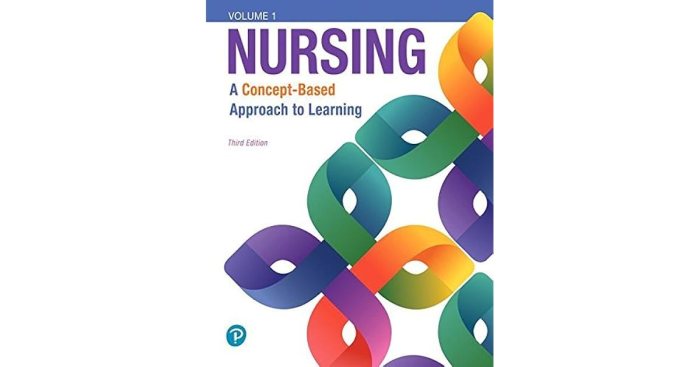Nursing a concept-based approach to learning 4th edition – Nursing: A Concept-Based Approach to Learning, 4th Edition, stands as a groundbreaking work that redefines nursing education. With its innovative approach, this text guides readers through the complexities of nursing, fostering a deep understanding of key concepts and theories that are essential for providing exceptional patient care.
This comprehensive text delves into the theoretical foundations of concept-based learning, exploring the frameworks that shape nursing practice and education. It meticulously identifies and defines key concepts and theories, providing real-world examples of their application in nursing practice. By integrating the nursing process with the concept-based approach, this text empowers nurses to provide patient-centered care that is both effective and evidence-based.
Theoretical Foundations: Nursing A Concept-based Approach To Learning 4th Edition

The concept-based approach to nursing is grounded in several theoretical frameworks, including:
- Systems theory:Views nursing as a complex system of interconnected parts that interact to achieve a common goal.
- General systems theory:Focuses on the relationship between a system and its environment, emphasizing the importance of feedback and adaptation.
- Nursing process:Provides a structured framework for nurses to assess, plan, implement, and evaluate patient care.
- Caring theory:Emphasizes the importance of compassion, empathy, and respect in nursing practice.
These frameworks guide nursing practice and education by providing a conceptual understanding of the nursing process, the patient experience, and the role of the nurse.
Key Concepts and Theories
Central to the concept-based approach are several key concepts and theories, including:
- Health:A state of complete physical, mental, and social well-being, not merely the absence of disease or infirmity.
- Nursing:The protection, promotion, and optimization of health and abilities, prevention of illness and injury, alleviation of suffering through the diagnosis and treatment of human response, and advocacy in the care of individuals, families, communities, and populations.
- Person:A complex, holistic being with physical, psychological, social, cultural, and spiritual dimensions.
- Environment:The internal and external factors that influence a person’s health and well-being.
These concepts and theories are applied in nursing practice to guide assessment, planning, implementation, and evaluation of care.
Nursing Process and Concept-Based Care
The nursing process is a systematic approach to patient care that is integrated with the concept-based approach.
- Assessment:Collects data about the patient’s health status, including physical, psychological, social, and cultural factors.
- Diagnosis:Identifies the patient’s health problems or potential risks.
- Planning:Develops a plan of care that addresses the patient’s health problems and goals.
- Implementation:Carries out the plan of care, including interventions and treatments.
- Evaluation:Assesses the effectiveness of the plan of care and makes necessary adjustments.
Using a concept-based approach to provide patient care ensures that nurses are focusing on the underlying concepts and principles that guide their practice.
Educational Implications, Nursing a concept-based approach to learning 4th edition
The concept-based approach can be used to improve nursing education by:
- Providing students with a deeper understanding of the fundamental concepts and theories that underpin nursing practice.
- Helping students to develop critical thinking skills and the ability to apply concepts to real-world situations.
- Preparing students to provide holistic, patient-centered care.
Implementing a concept-based curriculum in nursing education presents some challenges, such as the need for faculty development and changes to teaching methods, but the benefits outweigh the challenges.
Future Directions
The concept-based approach to nursing is a rapidly evolving field, with emerging trends and future directions including:
- Increased use of technology:Technology will play an increasingly important role in nursing education and practice, including the use of simulation and virtual reality.
- Focus on interdisciplinary collaboration:Nurses will need to collaborate more closely with other healthcare professionals to provide comprehensive patient care.
- Emphasis on global health:Nurses will need to be prepared to provide care in a global context, addressing the health needs of diverse populations.
These trends will shape the future of nursing practice and education, and the concept-based approach will continue to be a valuable framework for guiding these changes.
Questions Often Asked
What is concept-based learning in nursing?
Concept-based learning is an approach to nursing education that focuses on teaching key concepts and theories that are central to nursing practice. This approach emphasizes the interconnectedness of concepts and their application in real-world nursing situations.
What are the benefits of using a concept-based approach in nursing education?
The concept-based approach promotes critical thinking, clinical reasoning, and problem-solving skills. It also helps nurses to develop a deeper understanding of the theoretical foundations of nursing practice and to provide more effective and evidence-based patient care.
How is the nursing process integrated with the concept-based approach?
The nursing process is a systematic approach to providing patient care. The concept-based approach integrates the nursing process by using key concepts and theories to guide each step of the process. This ensures that nurses are providing care that is both individualized and evidence-based.